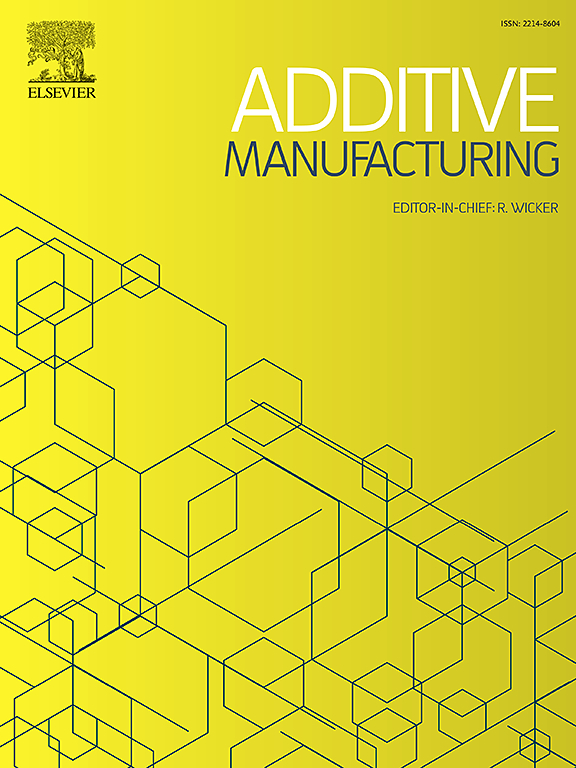Measuring thermomechanical response of large-format printed polymer composite structures via digital image correlation
IF 10.3
1区 工程技术
Q1 ENGINEERING, MANUFACTURING
引用次数: 0
Abstract
Large-format additive manufacturing (LFAM) is a branch of additive manufacturing (AM) research with the ability to create large structures typically measuring several meters in scale. LFAM is advantageous for tooling applications, not only because it offers the ability to create complex geometries not easily made using subtractive manufacturing processes, but the cost savings of pelletized feedstock used by these systems result in larger parts printed at faster speeds than traditional AM systems. Fiber reinforced polymer (FRP) is a commonly used feedstock material in LFAM structures because it reduces the distortion experienced during printing. However, FRP introduces highly anisotropic thermomechanical properties and contributes to a nonhomogeneous microstructure that can result in critical distortion of dimensions during tooling. Measuring the global thermomechanical response of LFAM structures requires a more representative method that accounts for not only anisotropic properties but also the nonhomogeneous nature of the final part. This is where traditional techniques to measure thermomechanical response, such as thermomechanical analysis (TMA), fall short as they assume homogeneity. This study evaluated the coefficient of thermal expansion (CTE) of LFAM structures as measured by TMA as compared to a novel digital image correlation oven (DIC Oven) system. The LFAM structures were made from 20 % by weight carbon fiber reinforced acrylonitrile butadiene styrene (CF-ABS). TMA measurements showed significant variations in CTE across a single LFAM bead, confirming the need for a global technique that captures overall thermomechanical response. The CTE values measured using the DIC Oven compared well to average TMA values obtained from localized measurements across the sample. The DIC Oven was also used to quantify the effects of different layer orientations on thermomechanical properties, which cannot be easily captured using TMA. A predictive model was also developed by using localized TMA values across an LFAM bead to predict the overall thermomechanical response of an LFAM structure.
通过数字图像相关性测量大幅面印刷聚合物复合结构的热机械响应
大型增材制造(LFAM)是增材制造(AM)研究的一个分支,能够制造出通常为几米的大型结构。LFAM 在模具应用方面具有优势,这不仅是因为它能够制造出不易用减法制造工艺制造的复杂几何形状,还因为这些系统使用的颗粒化原料节省了成本,因此能以比传统 AM 系统更快的速度打印出更大的部件。纤维增强聚合物(FRP)是 LFAM 结构中常用的原料材料,因为它可以减少打印过程中的变形。然而,玻璃纤维增强聚合物具有高度各向异性的热机械特性,会产生非均质的微观结构,从而导致模具加工过程中出现严重的尺寸变形。测量 LFAM 结构的整体热机械响应需要一种更具代表性的方法,这种方法不仅要考虑各向异性,还要考虑最终零件的非均质性。这正是传统的热机械响应测量技术(如热机械分析 (TMA))的不足之处,因为它们假定了均匀性。本研究评估了 LFAM 结构的热膨胀系数 (CTE),并将 TMA 与新型数字图像相关烤箱 (DIC Oven) 系统进行了比较。LFAM 结构由 20% 重量百分比的碳纤维增强丙烯腈-丁二烯-苯乙烯(CF-ABS)制成。TMA 测量结果表明,单个 LFAM 珠的 CTE 存在显著差异,这证明需要一种能够捕捉整体热机械响应的全局技术。使用 DIC 烘箱测得的 CTE 值与通过对样品进行局部测量获得的平均 TMA 值进行了很好的比较。DIC 烘炉还用于量化不同层取向对热机械性能的影响,而 TMA 无法轻松捕捉这些影响。通过使用整个 LFAM 珠的局部 TMA 值来预测 LFAM 结构的整体热机械响应,还建立了一个预测模型。
本文章由计算机程序翻译,如有差异,请以英文原文为准。
求助全文
约1分钟内获得全文
求助全文
来源期刊

Additive manufacturing
Materials Science-General Materials Science
CiteScore
19.80
自引率
12.70%
发文量
648
审稿时长
35 days
期刊介绍:
Additive Manufacturing stands as a peer-reviewed journal dedicated to delivering high-quality research papers and reviews in the field of additive manufacturing, serving both academia and industry leaders. The journal's objective is to recognize the innovative essence of additive manufacturing and its diverse applications, providing a comprehensive overview of current developments and future prospects.
The transformative potential of additive manufacturing technologies in product design and manufacturing is poised to disrupt traditional approaches. In response to this paradigm shift, a distinctive and comprehensive publication outlet was essential. Additive Manufacturing fulfills this need, offering a platform for engineers, materials scientists, and practitioners across academia and various industries to document and share innovations in these evolving technologies.
 求助内容:
求助内容: 应助结果提醒方式:
应助结果提醒方式:


